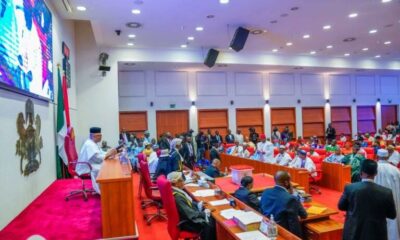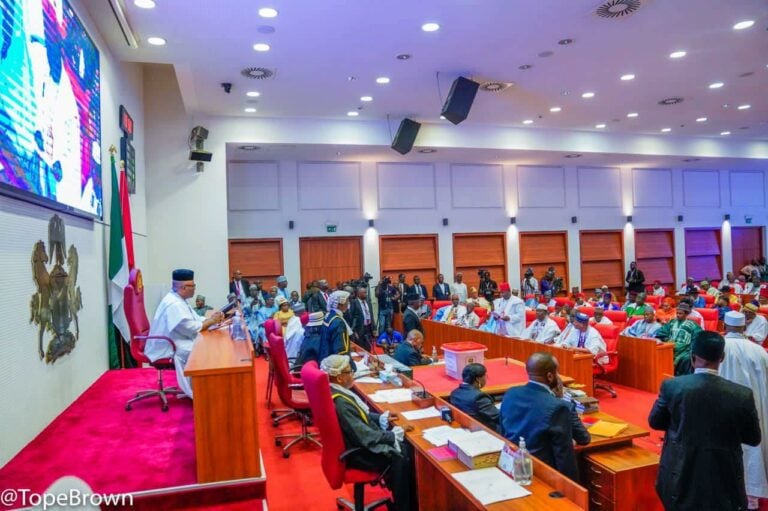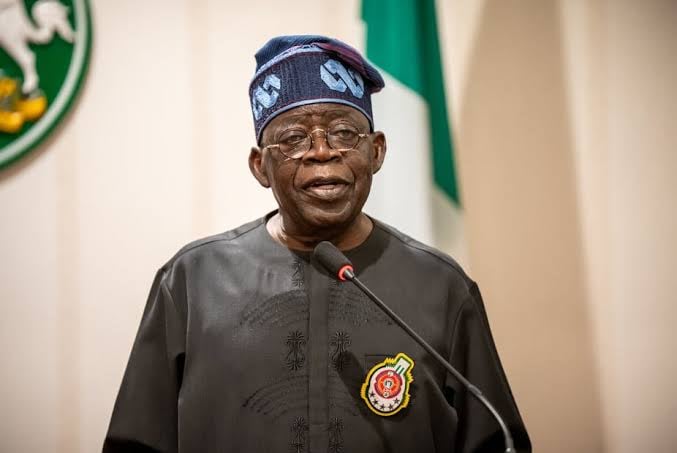The Senate on Wednesday announced a decisive move against the nation’s escalating insecurity, declaring kidnapping a form of terrorism and recommending the death penalty for perpetrators, with no option of fines or judicial discretion to reduce punishment.
The resolution followed intense debate after the November 18 attack on Christ Apostolic Church, Eruku, in Ekiti Local Government Area of Kwara State, where gunmen killed two worshippers and abducted 38 others.
Although security agencies later rescued all abducted victims through joint operations involving the army, police, DSS operatives and community vigilantes, lawmakers said the incident illustrated the growing southward spread of insurgent cells and highlighted the vulnerability of rural communities.
The resolutions originated from a motion presented by Senator Yisa Ashiru (Kwara South) titled “Urgent Need to Address Escalating Insecurity in Kwara, Kebbi, and Niger States and Strengthen National Security Frameworks,” which prompted a wave of contributions detailing attacks on schools, worship centres, highways and entire settlements.
Senators observed that repeated school abductions had forced the closure of all schools in local government areas across Kebbi and Niger states, five LGAs in Kwara State, and all 47 Federal Unity Colleges nationwide.
Senator Issa Jibrin (Kogi East) raised alarm over the country’s inadequate manpower capacity in security agencies, saying Nigeria’s entire security workforce “do not total one million,” unlike Egypt’s 1.5 million. He called for urgent enhancement of security equipment, intelligence coordination, and the creation of a reserve force to support exhausted troops.
Other contributions expressed concern that banditry was advancing toward Osun State through Ekiti-linked communities in the Eruku–Isapa–Koro axis, where a retired Army General and a traditional ruler were recently killed.
Lawmakers also linked criminal attacks to the poor condition of major roads, directing the Federal Ministry of Works to commence immediate reconstruction of the Idofian–Omu-Aran–Eruku–Egbe–Kabba route to limit criminal escape pathways.
As the debate intensified, senators agreed that kidnapping had evolved into terrorism and should attract the harshest punishment. Many insisted that “Capital punishment must apply,” adding that no judge should have the authority to reduce sentences for convicted offenders.
The Senate also urged President Bola Tinubu to “further rejig the nation’s security architecture,” which prompted Senator Ali Ndume to caution that such phrasing could be misinterpreted following the recent confirmation of service chiefs. The chamber later clarified that its appeal focused on enhanced coordination, technological upgrades, intelligence strengthening, and rapid deployment capabilities.
In a rare institutional introspection, the Senate disbanded its Committee on National Security and Intelligence and its Committee on Air Force with immediate effect. Other security-related committees were directed to present written oversight reports and brief the chamber in a closed session within one week.
Lawmakers further moved to bolster registered vigilante groups with federal support and initiated a review of the nation’s firearms laws to allow controlled arming of responsible individuals.
The resolutions followed a heated plenary session, with senators openly clashing over the expanding wave of kidnappings and mass attacks in several states.
Earlier, the chamber adopted a separate motion by Senator Asiru Yisa (Kwara South) commending President Tinubu and security agencies for the rescue of dozens abducted in Kwara and Niger States.
The debate grew more intense as lawmakers reviewed the kidnapping of schoolchildren in Kebbi, mass abductions in Niger, and the church attack in Eruku. Senator Ashiru said the Senate was “deeply disturbed” by the attack on the CAC church and expressed concern over reports that soldiers withdrew from the Kebbi school hours before bandits launched their assault.
Deputy Senate President Barau Jibrin argued that Nigeria must expand its search for solutions and “seek assistance from overseas, urging collaboration with global partners to stem the crisis.”
Senate Leader Opeyemi Bamidele described the security situation as defining and questioned the absence of data on terrorists neutralised during rescue operations. He also warned senators against political posturing and called for internal reform, stating, “If we are calling on the President to rejig the security architecture, we must also look into our own arrangement. I am not impressed with our Committee on Security and Intelligence. We should rejig it ourselves.”
Senator Enyinnaya Abaribe challenged attempts to attribute the crisis to previous administrations, insisting that the current government must take responsibility. He referenced reports of troop withdrawal before the Kebbi school attack, saying, “Who asked them? Nobody knows. If I were the Commander-in-Chief, I would demand answers.”
Senate President Godswill Akpabio expressed concern about intelligence leaks, recalling past instances where the location of a brigadier general killed in Borno was allegedly compromised. He also questioned how bandits managed to strike a school in Kebbi despite security warnings.
The session became rowdy when Senator Seriake Dickson claimed Nigeria was “losing prestige and integrity,” accusing the majority caucus of downplaying the seriousness of the crisis. His remarks provoked protests from APC senators, prompting Akpabio to mute his microphone.
Senator Adams Oshiomhole defended President Tinubu and demanded a probe into the reported troop withdrawal. He argued that “Who ordered the military to withdraw? That person should be tried for terrorism,” a proposal the Senate adopted. He also questioned inconsistencies in sentencing for terrorism cases and reiterated support for the death penalty for kidnappers.


 BIG STORY2 days ago
BIG STORY2 days ago
 BIG STORY3 days ago
BIG STORY3 days ago
 BIG STORY19 hours ago
BIG STORY19 hours ago
 BIG STORY2 days ago
BIG STORY2 days ago
 BIG STORY1 day ago
BIG STORY1 day ago
 BIG STORY3 days ago
BIG STORY3 days ago
 BIG STORY3 days ago
BIG STORY3 days ago
 BIG STORY17 hours ago
BIG STORY17 hours ago





















